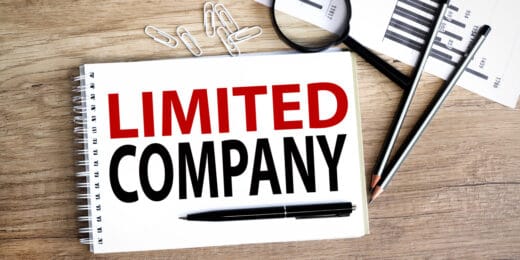If you want to start a business in the UK – as a UK resident or non-resident – you should first evaluate whether or not you are permitted to. This is because, whilst the rules on who can register a UK business are fairly relaxed, there are some restrictions in place.
In this article, we explain what it means to register a business in the UK and look at who can and can’t do this.
Key Takeaways
- The two most common ways to structure your business are to register as a sole trader or a limited company with Companies House.
- As long as you have a National Insurance number, you can register as a sole trader regardless of your nationality or country of residence.
- To register a UK limited company, you’ll need to appoint at least one shareholder and one director. One person can hold both roles, and they must meet the directors’ qualifying criteria.
What does ‘registering a business’ mean?
There are two main ways you can ‘register’ a business:
- Registering as a sole trader with HMRC
- Registering a company limited by shares with Companies House
A sole trader and a limited company are two very different structures through which you can run your business.
With a sole trader, there is no legal distinction between the person and the business; you are essentially the business. If the business were to encounter financial difficulties or be sued, the owner’s personal assets would be at risk.
Comparatively, in a company limited by shares, the owners (known as the shareholders) are legally separate from the business itself. This provides financial protection if the company were to accrue debts or face legal action.
If you intend to operate as a sole trader, you will need to register your business with HMRC if you earn more than £1,000 during a tax year. By contrast, if you wish to operate your business through a limited company, you need to register the company with Companies House before you start trading.
For more information about the advantages and disadvantages of both structures, we recommend reading this article: Sole trader or limited company?
Who can register as a sole trader?
Registration as a sole trader is simple. You need only basic information about your business (namely, the business’s trading name).
You can register as a sole trader regardless of your nationality and place of residence, provided that you have a National Insurance (NI) number. If you don’t have an NI number, you can apply if you are currently living in the UK and have the right to work in the UK. You cannot apply from outside of the UK.
NI numbers are automatically allocated to UK residents just before their 16th birthday. However, you can apply for one earlier if you have not yet reached your 16th birthday. You can also register as a sole trader even if you have been declared bankrupt or if you have been disqualified from being a company director.
See here for more information about registering as a sole trader, including how to get started.
Who can register a limited company?
To register a private company limited by shares, there are some eligibility requirements you and your company need to meet. Firstly, you will need at least one shareholder and one director. The good news is that this can be the same person taking on both roles, which means you can set up a company all by yourself. Alternatively, you can have multiple people taking different roles.
1. Shareholder eligibility
The law provides very few restrictions on who can be a shareholder, so virtually anyone can take up shares in a UK company. Nationality, location, and age do not matter, and you don’t need an NI number.
A key point to note is that, whilst a child can be a shareholder, there may be contractual issues in them doing so. You should take professional advice as to whether this is a good idea.
2. Director eligibility
When it comes to the role of the director, there are a few rules to note. Nationality and place of residence still do not matter and, again, there’s no need for an NI number. But to be a director, an individual must:
- Be at least 16 years old
- Not be an ‘undischarged’ bankrupt (a person currently going through the bankruptcy process)
- Not be disqualified from being a company director (unless a court has granted permission)
- Not otherwise be prevented from acting as a director
A person can be disqualified from being a director for a number of reasons, all of which are related to unfit conduct in a previous directorship. However, if an individual has not been a company director before, they will not be disqualified.
3. Company address requirements
As you can see, the rules on who can register a company are relatively relaxed. However, to set up a company in the UK, the company itself will need to meet an additional requirement: having a UK-based registered office address.
A registered office address is the company’s ‘official’ address. Amongst other things, this is where government bodies such as Companies House, HMRC, and the Information Commissioner’s Office will send their correspondence.
Any address (including residential, although this is not recommended for privacy reasons) can be used as a registered office address, provided that:
- The address is in the UK (and in the same jurisdiction where you registered your company)
- The property owner has granted their permission for the address to be used as a registered office
- The address is able to receive and acknowledge recorded deliveries
- Correspondence sent to the address will come to the attention of someone working for the company
As a result, companies have quite a bit of flexibility on the address they can use, such as using a registered office address service.
To summarise, whilst there is a requirement for you to use a UK address when setting up a UK company, in practical terms, this is easily solvable and does not prevent non-residents from setting up a company in the UK.
So, there you have it
We hope this article has been useful in helping you understand whether or not you can register a business in the UK. Although there may be some additional practical considerations, it is relatively easy for anyone to set up a business in the UK, particularly if they are over the age of 16.
If you have decided that a company limited by shares is the right route for you and your business (and you meet the directors’ qualifying criteria), we can help register your company through our range of company formation packages, where prices start from £2.99.
What’s more, if you are a non-UK resident, we offer dedicated Non-Residents Packages from £99.99 that provide you with everything you need to register a company in the UK, including our Registered Office Address Service. Our packages do not include the Companies House filing fee of £50.00.
Thanks for reading. Please leave a comment if you have any questions, and browse the Rapid Formations blog for more articles like this.
Please note that the information provided in this article is for general informational purposes only and does not constitute legal, tax, or professional advice. While our aim is that the content is accurate and up to date, it should not be relied upon as a substitute for tailored advice from qualified professionals. We strongly recommend that you seek independent legal and tax advice specific to your circumstances before acting on any information contained in this article. We accept no responsibility or liability for any loss or damage that may result from your reliance on the information provided in this article. Use of the information contained in this article is entirely at your own risk.












Join The Discussion